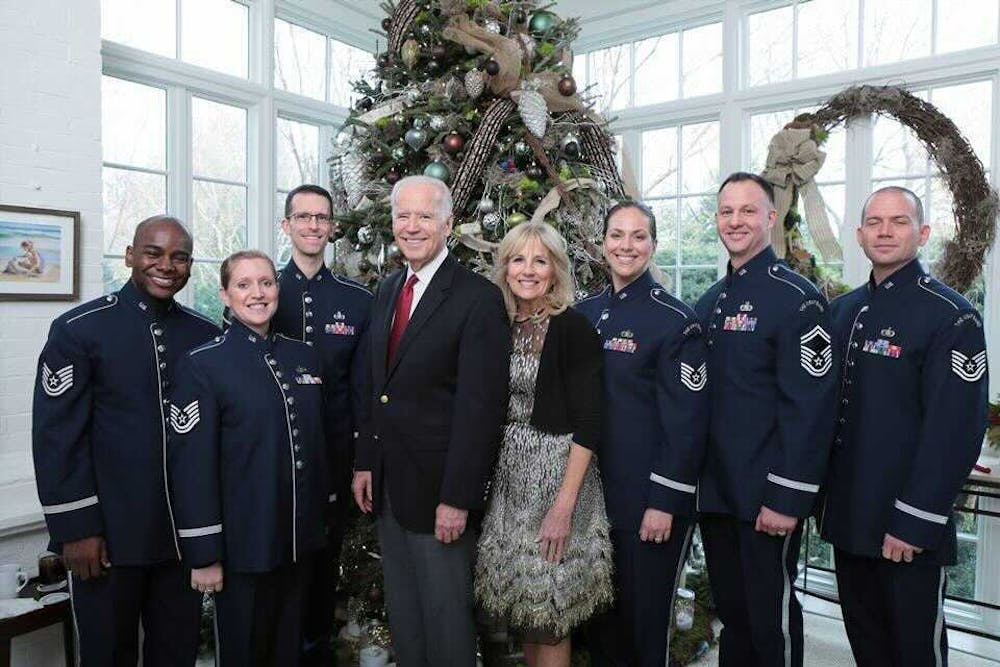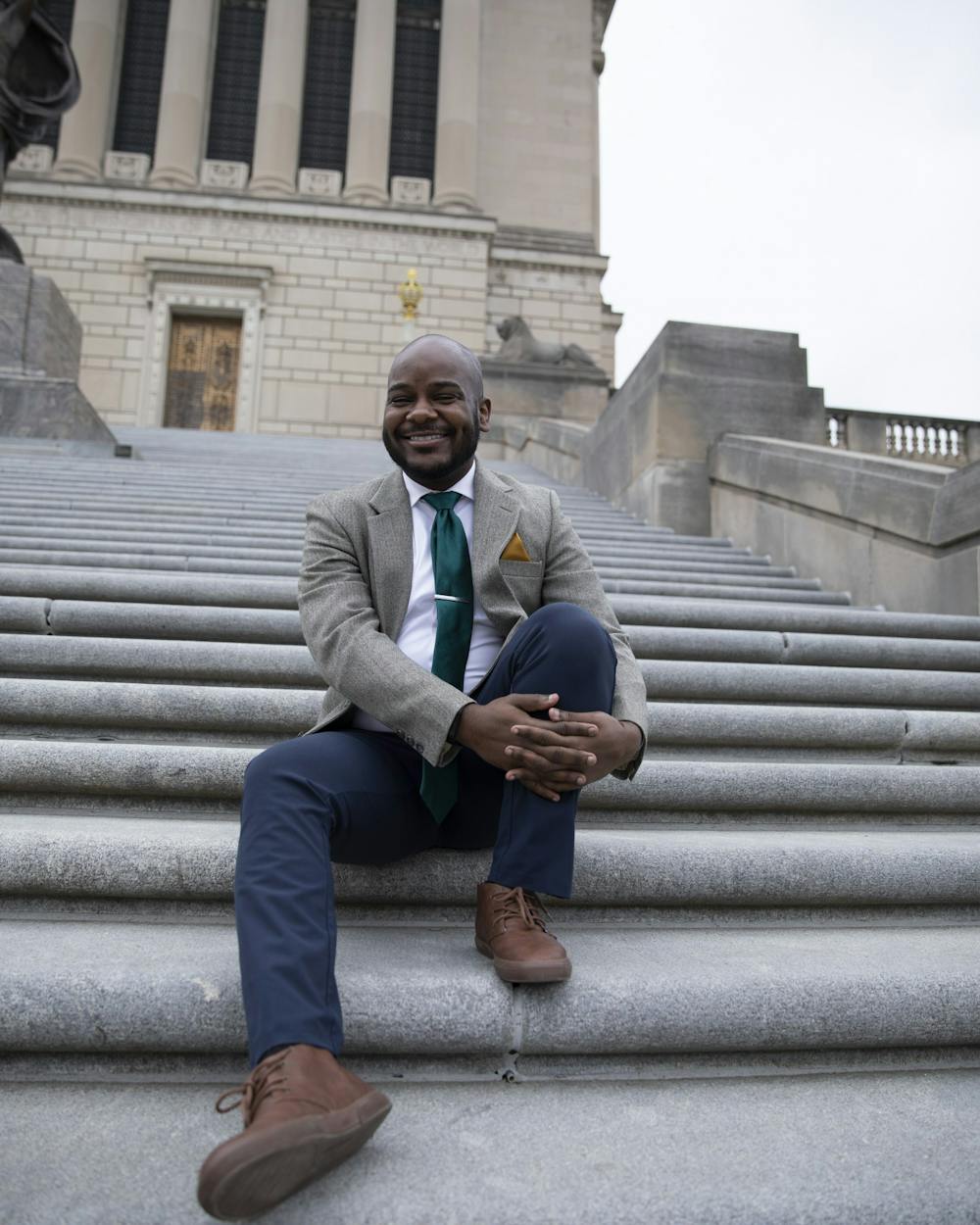Born and raised in Detroit, the city where “everybody can sing,” Aaron Paige, Ball State assistant professor of music, said singing has been a prominent part of his life for as long as he can remember.
Because his father was his church's preacher, Paige grew up singing in front of his congregation. In high school, Paige’s choir director was the first person he met who showed him how serious singing could be, as she would often tell him, “How can you be breathing if you’re not practicing music?”
As her student, Paige realized he could enjoy music outside of performing at church and listening to the radio. He realized then he wanted music to change him for the better.
“As a soloist, for a long time, I was very reluctant to sing in front of my family,” Paige said. “I was always singing [in front of] teachers and other people I didn't know. I got attracted to music through classical music, and I felt, ‘My family’s not going to like this. They don't understand that I'm singing in Latin or I’m singing in French.’ But, my family knew I could sing because they had heard me sing before.”
Joining the Singing Sergeants
As a young musician, Paige said, he took any job he could get. While attending graduate school at The Ohio State University, Paige was leaving a wedding he performed at when he saw a poster advertising an open tenor vocalist position for the Singing Sergeants of the United States Air Force Band.

One of the performances that sticks out for Paige is when he sang the national anthem for Super Bowl 48 in 2014 with Renée Fleming, a famous operatic soprano singer. “I remember walking into the arena, and I could feel the place shaking [because of] how many people were there,” Paige said. Aaron Paige, Photo Provided
Paige was drawn to the opportunity because the opening salary on the poster was more than $50,000. As a “poor college student,” this persuaded him to learn more.
“Instead of taking one of the little slips, I took the whole flyer,” Paige said. “It was just on a whim. I had been applying for a lot of jobs. I thought I was going to be a choir teacher. I thought my goal was to teach choir or musical theater.”
After sending a CD to the Air Force Band, Paige drove from Ohio to Washington, D.C. for his audition. It was one of the most difficult auditions he’d ever done, he said, as he sang opera, jazz, musical theater and pop music for most of the day.
When Paige was hired for the job, he didn’t accept it right away. He took time to sleep on it, which he encourages everyone to do.
“My brother had been in the military. I am a screeching, bleeding heart liberal, so I just didn't know how I felt about getting in the military,” Paige said. “I talked to a couple mentors, and they explained to me how important the opportunity was, that it was not something I had to do forever but would give me the experiences that would propel me for what I wanted to do in the future.”
After praying on it, Paige took the leap of faith and enlisted into the U.S. Air Force July 10, 2012. For eight-and-a-half weeks, Paige trained at an Air Force boot camp in San Antonio.
“I've never been so uncomfortably hot in my entire life,” Paige said. “[We would] go outside at 5:30 a.m., and it was already 89 degrees. The sun was not up, and it was already hotter than it normally was in the Midwest.”
Performing around the world
For six years, Paige was a member of the U.S. Air Force Singing Sergeants, where he sang with nearly 20 of “the best musicians in the world,” he said.
At 23 years old, he became the tenor section leader. He organized his section’s duties and scheduled visits to colleges, high schools and elementary schools around the globe.
With a master’s degree in vocal performance, Paige was accustomed to singing opera and classical music before joining the Singing Sergeants. For his first performance in 2012, Paige said he was startled when he had to sing multiple pop hits, including Stevie Wonder’s “You Are the Sunshine of My Life.”
“I thought it was going to be Pavarotti, and here they are asking me to be Bruno Mars,” Paige said. “I had sung pop music in the car and in the shower, but I had never done it for important people before. I was terrified to do my first gig because I knew that everybody was looking at me.”

Aaron Paige (far left) attends an annual holiday party at then-vice president Joe Biden’s house in December 2015. When singing in front of important people like the president, Paige said, he barely notices when they are in the room because of how focused and determined he is to do his job. Aaron Paige, Photo Provided
Singing in front of presidents and heads of states never got easier, Paige said, as his performances felt similar to a tightrope act with no net. He said performing the “Star Spangled Banner” to pay tribute to veterans was also a stressful job.
“Everybody knows that song, so, if you mess it up, it is not just one song that you mess up — you're messing it up because you're in uniform, and this is literally your job to do it,” Paige said. “When you sing well, it really is impressive, but if you fail, you will fall, and you will hurt a couple of people coming down. You embarrass [yourself] quite a bit.”
Paige said he felt the pressure when performing for other countries’ leaders as well. He would often sing these countries’ national anthems to honor them, but he never sang or studied these countries’ languages as a trained musician.
“We learned a couple skills to [understand other] languages really quickly, but there's an extra layer of stress that I can't just make it up for people who actually speak this language,” Paige said. “It is culturally a part of who they are. It's a little disrespectful, culturally, to fudge languages.”
Developing friendships
During Paige’s time in the Air Force Band, one of his best friends was Tech Sgt. Stacey Holliday, who joined as an alto vocalist in 2016. She attended a music teacher conference in November 2015 where she heard the U.S. Army Band perform, and their talent “blew her mind.”
Returning home from the conference, Holliday researched whether the U.S. Air Force had a band because her dad retired from the Air Force in 1998, and she wanted to follow in his footsteps in her own unique way.
Her audition for the U.S. Air Force Singing Sergeants was Feb. 29, 2016, in Washington, D.C., and Paige was on the panel of judges. Holliday said Paige guided her throughout the audition process, and he was open to conversation and answering any of her questions.
“He introduced himself — super friendly — and, if you're familiar with music auditions, that's not normal,” Holliday said. “A lot of times, you go in either for a jury or for an audition, and the faculty is like, ‘What's your name? What are you going to play?’ Just very cold, very methodical. This group of people was not like that at all, especially Aaron. He's just warm, bubbly and wonderful.”
As the two traveled the world together as members of the Singing Sergeants, Holliday said, she felt as though she had known Paige all her life.While she is older than Paige, Holliday said, he is one of her role models because he sings beautifully and is also great at teaching and encouraging others.
If there was ever a rehearsal where Holliday felt she didn’t sing as well as she could, she would turn to Paige, and he would always start off with what she did well and then give her examples of how she could improve. Paige’s advice always came from a place of positivity, she said.
“In addition to singing on stage together, we’d hang out, we’d go out to eat, we’d go for walks and explore whatever city we were in together,” Holliday said. “It was a tradition after I moved [to Washington, D.C.] because I didn't know anyone else, [so] I'd go to his house for Thanksgiving every year. We'd eat this humongous meal and watch ‘The Wiz’ afterward. I love him to death.”
Settling in Muncie
Even after Paige separated from the Air Force to pursue other interests in July 2018, he and Holliday stayed in touch. She considers him one of her closest friends, she said, even when they don’t see each other every day like they used to.
“We're such good friends, and I know we will be forever,” Holliday said. “It's bittersweet — I'm happy for him, but I miss him a lot. I'm so thrilled that he's loving what he's doing now, but I do feel like the Air Force Band suffered a great loss when he left.”
While visiting students around the world, Paige said, he realized he was meant to lead a classroom. Whenever Paige would speak to students, magic would happen, he said, as they would pay attention to his every word.
“Singing is fun, but being a grown up, you realize, ‘I think I actually want to have an impact that outlasts when I am in a room,’” Paige said. “If I give you skills, encouragement and life tools that live even beyond you, my legacy starts to perpetuate, and I realized that's what you can do as a teacher. I weighed my options, and I knew, with all my heart, that teaching is what I was meant to do. I want to give somebody the opportunities that somebody gave to a young Aaron Paige.”
Because he valued the direction of Ball State’s School of Music, Paige said, the home of the Cardinals was “hands down” the best opportunity for him. Now, Paige is an assistant professor of music, and he gives vocal lessons to nearly 20 students.
“It is rewarding when I can see my students taking the passion that I've scraped up and try to make sure I throw at them at every lesson, and they infuse that in what they love,” Paige said. “It doesn't have to be music. It won't be music for everybody. We don't need everybody doing music, but I think that I want them to reflect that passion in whatever they do.”
Meryl Mantione, professor of voice performance and Paige’s supervisor at Ball State, said she first met Paige during the summer of 2020 after he was hired that previous spring. Because Mantione was on sabbatical when Paige was hired, she met with Paige and his partner to have lunch at Roots Burger Bar. She believes Paige is the future of the music professors, as he has personal experience performing across a variety of genres while sounding authentic, which isn’t easy to do.
“I've always believed that one of the most important things that we can do is bring young, new blood into faculty positions,” Mantione said. “His personality is one thing, but his knowledge and his experience is different from the rest of us who have been here and certainly different from mine. It's what we need to provide our students with what they need for the real world.”
Every day, Paige works to be a good teacher and human, he said, because he wants to be a resource and role model to all Ball State students, even if they aren’t his voice students.
“I do not take the charge lightly to be not only a young professor at Ball State, but a young, Black, queer, cisgender man at Ball State,” Paige said. “I know I represent more than myself. I hope I can continue to be a role model in any and every way that I have available to me because I know how important that representation is on every intersectional front. That is my existence.”
Contact Sumayyah Muhammad with comments at smuhammad3@bsu.edu or on Twitter @sumayyah0114. Contact Nicole Thomas with comments nrthomas3@bsu.edu or on Twitter @nicolerthomas22.





